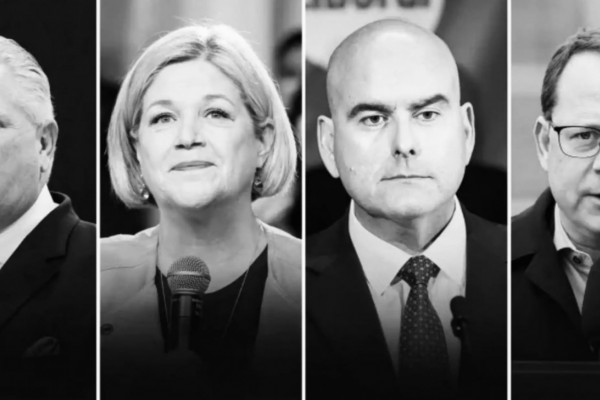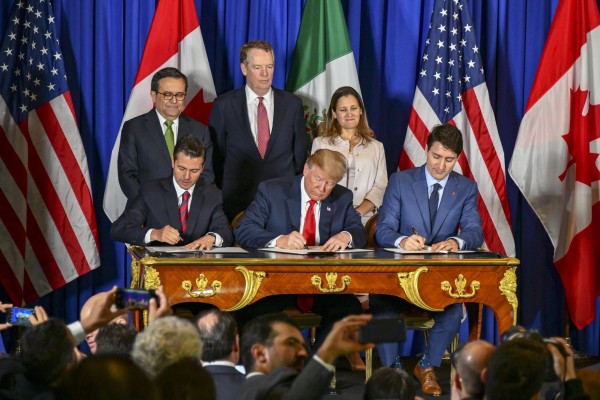The collapse of voter turnout in Saskatchewan
Our democracy is being eroded by disinformation and corporations whose interests are best served by increasing voter apathy

Photo by Peter Pelisek/Flickr
While we were waiting for the writ to be dropped for the Saskatchewan election, scheduled for October 28, I’ve been thinking about what it is that brings some people to the ballot box, while others stay at home. And then how that affects what we like to call our democracy.
A long time ago, back in the fall of 1976, I was a student at the University of Saskatchewan taking a minor in political science. My first class in that subject was taught by Professor John Courtney. Professor Courtney came to class in a neat suit and tie every day. He spoke with great composure and care, in sentences where you could almost see the periods, commas and semi-colons that gave order to whatever he said. Always expressed with precision, but also with great respect for the subject matter and for his students.
At the time I probably thought of him as a conservative person, but that was in the days when “conservative” could mean someone who is cautious because they know that political choices often carry unintended consequences. He became one of my favourite professors and I continued to take classes from him in Canadian politics and governance.
Professor Courtney died late last year after a life well lived in which, I am happy to report, he did not retire to warmer climes and instead chose to stay in the province and remain active as one of Saskatchewan’s great thinkers and political commentators.
It was his knowledge of how the political scene had changed over his lifetime that made Courtney’s perspective so valuable and worthy of respect. Even at the age of 85 he was still publishing books. Revival and Change, his authoritative study of the Diefenbaker era, came out in 2022. In his last years, the media continued to turn to him for his cogent and thoughtful analysis of Canadian politics.
Democracy eroding
When Premier Scott Moe decided he should get behind the so-called “trucker convoy” that had Ottawa under a siege of anti-vaccination noise in early 2022, and announced that “vaccination is not reducing transmission,” adding, “an unvaccinated trucker does not pose any greater risk of transmission than a vaccinated trucker,” Courtney responded in the media.
“This is an attack on science, on truth,” he said. “A line has been crossed. I have not seen anything like this in my years. For the life of me, I can’t think of an example in Canadian history.”
Supporters of the convoy might dismiss a man like Courtney as an ivory tower egghead, but there is no way to diminish his contribution to Saskatchewan in an era when our democracy is being eroded by disinformation and corporations whose interests are best served in elections where fewer and fewer people vote.
Among the last papers he wrote was one about voter turnout in Saskatchewan and I think it is worth drawing some attention to it as we move towards a fall election.
In the paper, Courtney explained that voter turnout in Saskatchewan’s provincial elections had, until recently, ranged from 80-85 percent of the eligible voters—a sign of some faith in our political system. That began to change dramatically around 1990, with turnout dropping sharply every election. The election in 2021 saw a new low, when a scant 52.86 percent of eligible voters exercised their franchise. This was no doubt partly because of the COVID-19 pandemic, but it is worth noting that during the previous election, in 2016, turnout was scarcely any better at 56.8 percent. This is the same vote that brought Moe’s version of the Saskatchewan Party to power.
“Voter turnout,” Courtney wrote, “is an important indicator of a political system’s legitimacy and well-being. For the better part of a century, Saskatchewan had one of the highest levels of voter turnout among the provinces. This pointed to a considerable support for, and engagement in, the political system on the part of Saskatchewan citizens. Those days are now behind us.”
Toward the end of the paper, Courtney speculated that one cause of the precipitous drop in voter participation might be “the widespread disinterest in and indifference to the political process, particularly among younger people.” He also mentioned social media, the absence of “civics” in school curricula, and an overall decline in people participating in clubs, civic organizations and political parties.
A political shift
As I read his comments, I began thinking about how these trends have arisen in the same four decades that saw a political shift in Saskatchewan, and elsewhere, towards neoliberalism.
Left-wing commentators like to toss the phrase at conservatives as a kind of insult. Probably not the best way to engage in a political discussion, but the term itself is helpful because it properly names the ideology that currently has much of the world in its thrall.
Neoliberalism is often explained as a reaction to the welfare state and Keynesian economics that was informing at least some government policy in the decades immediately following the Second World War. During the “stagflation” crisis of the 1970s, political rhetoric began to include a lot of talk about the virtues of the free market, privatization, and free trade.
Individual freedom to pursue and gather wealth, and the rights of private property and corporations to act in their own interests, we were told, would bring the most good for the most people. But, for that to happen, governments would have to get out of the way by privatizing public assets, reducing taxes and eliminating regulations, tariffs and social and cultural programs.
By the 1980s, North America, the UK and much of Western Europe was in the hands of privatizing and de-regulating governments. Ronald Reagan and Margaret Thatcher are often mentioned as the two global flag-bearers at the head of the parade toward the neoliberal era.
Along the way, our political capacity for change and reform, even in the face of planetary crises, has been overwhelmed by a shift in ideology that favours the freedom to pursue private wealth and economic growth over all other considerations. In Canada and many other nations, the trend toward neoliberal policy has set us on a self-destructive path that makes it harder to elect governments that will act in ways that protect the interests of more vulnerable citizens, not to mention the long-term values of environmental health.
Giving up on political change
Which brings us back to declining voter turnout here in Saskatchewan. When the political climate in which you live seems hostile to the needs and values of your class and community, but friendly to the wealthy and privileged few, should we be surprised at record levels of disillusionment with mainstream politics and the electoral process?
Forty years of neoliberal policy has widened wealth inequality and helped create a housing crisis, but it has also produced a generation that has seemingly given up on the possibility of political change, trapping all of us in a feedback loop of disengagement and apathy that makes it difficult to unseat reactionary governments. More than eight hundred thousand citizens were registered to vote in Saskatchewan’s last provincial election. Just over half of them actually turned out. 52.86 percent, which amounted to 445,011 people. But another 375,839 chose not to vote. I suspect that many of them were under the age of 35. The Saskatchewan Party received 269,996 votes, which means that among all the voters who were registered (not to mention unregistered but eligible), only 32 percent voted for the Saskatchewan Party. Fewer than one in three people who could have voted in the last election chose Scott Moe and his party when they marked their ballot.
Undoubtedly, many of the registered voters who did not vote would also have voted for the Saskatchewan Party, but I think we need to consider the possibility that a higher percentage of voters who actually take the trouble to vote these days are going to be people relatively comfortable with the status quo and motivated primarily by self-interest, while those who feel sidelined and know they have little to gain stay home on election day.
Understanding that neoliberalism is now the political water that we are swimming in also helps us become perhaps a bit more patient with our provincial NDP leadership—which, granted, is not pushing hard enough on issues of climate change, housing, poverty, and Indigenous land rights. You hear people saying the NDP must return to their agrarian socialist roots and communitarianism, but when a good portion of the agrarians who are motivated to vote are voting on libertarian values, we can understand how the neoliberal age has moved formerly socialist parties toward the centre of the political spectrum.
Professor Courtney might well have dismissed all of this as a far too simple explanation for something as complex as declining voter turnout, but if he were still with us I would ask him what would bring Saskatchewanians back to the voting booth.
As we head to an election that is predicted to return to power a government that blocks any real climate action, and tramples on the rights of transgender children, while the premier courts anti-vaxxers and conspiracy theorists, the reasons to get out and vote are mounting, but no one will be surprised if voter turnout is low again in the province that once had some of the most politically engaged citizens in Canada.
Trevor Herriot is a Regina-based author and activist.







_600_400_90_s_c1.jpg)


